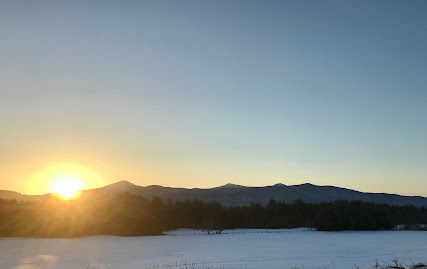Meadows at this season
are more ruffled -- the waves look
quite angry and black.
A gull
of pure white
outline
simple and wave-like
two curves
in the air.
Blown up on their edges
thin cakes of ice now and then
glisten in the sun.
March 29, 1854
A field of ice drifts
and forms a shining white wall
against the eastern shore.
Inhale
with pleasure
the
wholesome cold air over
now
sparkling water.
March 29, 2016
The water on the meadows looks very dark from the street. Their color depends on the position of the beholder in relation to the direction of the wind. There is more water and it is more ruffled at this season than at any other, and the waves look quite angry and black. March 29, 1852
It is a surprising and memorable and, I may add, valuable experience to be lost in the woods, especially at night . . . not till we are completely lost or turned round, - for a man needs only to be turned round once with his eyes shut in this world to be lost,- do we appreciate the vastness and strangeness of nature . . . In fact, not till we are lost do we begin to realize where we are, and the infinite extent of our relations. March 29, 1853
Coldest night. Pump freezes so as to require thawing. See two marsh hawks, white on rump. A gull of pure white, - a wave of foam in the air. How simple and wave-like its outline, two curves, - all wing - like a birch scale. Fair Haven half open; channel wholly open. Thin cakes of ice at a distance now and then blown up on their edges glistening in the sun. A hen-hawk, - two - circling over Cliffs. March 29, 1854
Flint’s Pond is entirely open; may have been a day or two . . .Walden is more than half open, Goose Pond only a little about the shores, and Fair Haven Pond only just open over the channel of the river . . . looking over Walden, more than half its surface already sparkling blue water, I inhale with pleasure the cold but wholesome air like a draught of cold water . . . I feel an impulse, also, already, to jump into the half-melted pond . . . A field of ice nearly half as big as the pond has drifted against the eastern shore and crumbled up against it, forming a shining white wall of its fragments. March 29, 1855
March 29, 2016
Another cold day. Scarcely melts at all. Water skimmed over in chamber, with fire. March 29, 1856
Walden open, say to-day, though there is still a little ice in the deep southern bay and a very narrow edging along the southern shore. Cross through the woods to my boat under Fair Haven Hill. How empty and silent the woods now, before leaves have put forth or thrushes and warblers are come! Deserted halls, floored with dry leaves, where scarcely an insect stirs as yet. March 29, 1857
Hear a phoebe early in the morning over the street. Considerable frost this morning, and some ice formed on the river. The white maple stamens are very apparent now on one tree, though they do not project beyond the buds . . . Nearly as warm and pleasant as yesterday. I see what I suppose is the female rusty grackle; black body with green reflections and purplish-brown head and neck, but I notice no light iris. By a pool southeast of Nathan Barrett's, see five or six painted turtles in the sun, – probably some were out yesterday, — and afterward, along a ditch just east of the pine hill near the river, a great many more, as many as twenty within a ro. . . . The narrow edges of the ditches are almost paved in some places with their black and muddy backs. They seem to come out into the sun about the time the phoebe is heard over the water . . . March 29, 1858
March 29, 2019
Walden is first clear after to-day. March 29, 1859
Calm, warmer, and pleasant at once. March 29, 1860
A Book of the Seasons, by Henry Thoreau
"A book, each page written in its own season,
out-of-doors, in its own locality.”
~edited, assembled and rewritten by zphx © 2009-2019










